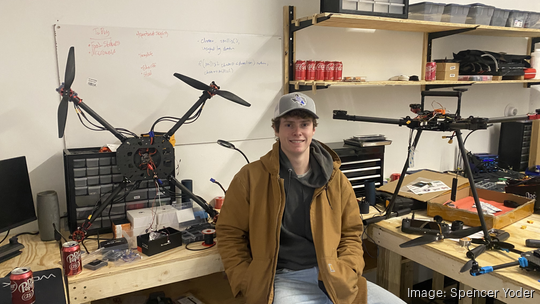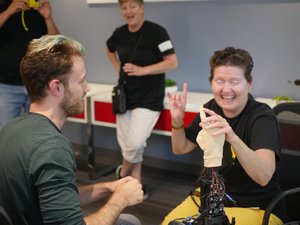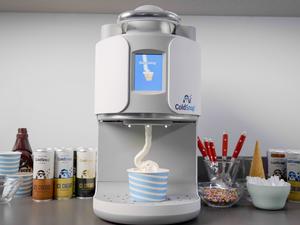
Growing up in Boerne, Texas, and spending time on his grandparent’s farm, Ethan Thornton was constantly building things.
After leaving Texas, Thornton went on to pursue entrepreneurship and engineering on his own, founding Mach Industries, a company developing a suite of defense systems and weapons using hydrogen.
After just one semester attending college at MIT, Thornton dropped out to pursue Mach Industries full time. Now, he will have a new support system outside of school to help him scale.
The 19-year-old is among 20 young people named to the latest class of Thiel Fellows. He will receive $100,000 and access to the Thiel Fellows network to support him as he builds Mach Industries.
The program was created by tech entrepreneur and investor Peter Thiel. Since 2011, the two-year fellowship has supported young people who want to build their own venture instead of attending school. Participants must not attend or pause their college experience to take part in the Thiel Fellows program.
“Young founders with radical projects know universities will only hold them back. More than a third of this year’s applicants never applied to college and instead are following their own path,” Alex Handy, director of the Thiel Fellowship, said in a statement. “Members of this year’s class are not preoccupied with chasing trends, whether in Silicon Valley or on TikTok. They are acting on concrete plans to improve the world around them.”
There are 251 founders who have gone through the Thiel Fellowship, including the leaders of companies like Ethereum, Luminar and Figma.
Joining the Thiel Fellows ranks
Thornton said he has long been interested in the defense industry. His mother’s family has a history with the Air Force and he grew up building and flying planes. He applied to MIT for its aerospace engineering program because since he was five years old, he dreamed of becoming a pilot and even an astronaut.
“The aerospace engineering program is one of the best, if not the best, on the planet. Unfortunately I dropped out before I really had the chance to enjoy it to its fullest,” Thornton said.
The seeds for Thornton’s business, which he now focuses on full time, started back in high school.
“One of those projects in high school...it would have been sophomore or junior year, was making a gun that you electrolyze water to make hydrogen and oxygen, and then you combust that hydrogen, oxygen, those gasses, to propel a projectile,” Thornton said.
Guns using a similar combustion approach had existed for years, Thornton said, but he took steps to rework and simplify the design and patent his work.
When he arrived at MIT, he had access to new resources, including the MIT Lincoln Laboratory. Thornton said one of this organization’s big projects is hydrogen implementation for the military.
“It’s a cool energy source. And it’s very unique in that it can do combustion and electricity. So you can run a fuel cell on it or you can burn it and you can also get it from electricity,” Thornton said.
Thornton said hydrogen is a very compelling, broad logistical solution for the military because they currently rely on many different forms of energy, including gunpowder, diesel, gasoline and nuclear.
Reinvigorated by his time at MIT, Thornton began to refocus his efforts on his high school project. He rebranded the company as Mach Industries, took advantage of military contacts he met at Lincoln Labs and raised some capital. He declined to share the amount.
Thornton said he has a space in Charlestown where they are working on de-risking the hydrogen production and combustion, with a focus on guns and a few other “tangent systems.” He said the company is bringing on a few people to work on their government outreach.
And, after one semester at MIT last fall, Thornton stopped attending college to focus entirely on his business. He said this was before he applied to the Thiel Fellowship and this program did not influence his decision to leave MIT. Thornton said he’d like to finish his degree at MIT at some point in his life, but at the moment, he doesn’t want to give less than his full effort to either endeavor — his business or college.
Thornton said he stayed in the Northeast after leaving MIT because of the strong venture capital community and talent pool. But long term, he sees himself building the company back home in Texas and focusing on defense systems.
“A lot of what we’re working on right now is air defense systems, and that’s what compels me most on the mission perspective is buffing up the way the U.S. (defends) strategic assets,” Thornton said.
Sign up for The Beat, BostInno’s free daily innovation newsletter from BostInno reporter Hannah Green. See past examples here.
A previous version of this story misidentified the location of Ethan Thornton's family farm.








